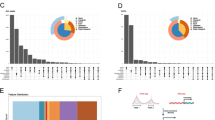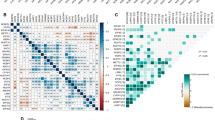Abstract
Aim
We compared the expression of genes related to inflammatory and cytotoxic functions between MSI and MSS (HLA-class I-negative and HLA-class I-positive) colorectal cancers (CRCs), seeking evidence of differences in inflammatory mediators and cytotoxic T-cell responses. Twenty-two CRCs were divided into three study groups as a function of HLA class I expression and MSI phenotype: 8 MSI tumours, 6 MSS/HLA− tumours and 6 MSS/HLA+ tumours (controls).
Findings
A first comparison between eight MSI and six MSS/HLA-positive (control) cancers, based on microarray analysis on an Affymetrix® HG-U133-Plus-PM plate, identified 1974 differentially expressed genes (P < 0.05). We grouped genes in Gene Ontology functional categories: apoptotic programme (72 genes, P = 5.5·10−3), leucocyte activation (43 genes, P = 1.8·10−5), T-cell activation (24 genes, P = 6.3·10−4), inflammatory response (40 genes, 2.3·10−2) and cytokine production (10 genes, P = 1.9·10−2). Real-time PCR and immunohistochemical evaluation were used to validate the data, finding that increased mRNA levels of pro-inflammatory cytokines and cytotoxic mediators were associated with greater infiltration by CD8+T lymphocytes in the MSI group (P < 0.001). Finally, HLA-class I-negative tumours were not grouped together but rather in accordance with features of the gene expression profile of MSI or MSS tumours. As expected, genes associated with antigen processing machinery and MHC class I molecules (TAP2, B2m) were downregulated in MSS/HLA-class I-negative CRCs (n = 6) in comparison to controls.
Conclusions
In conclusion, microarray and immunohistochemical data may be useful to comprehensively assess tumour–host interactions and differentiate MSI from MSS cancers. The two types of tumour, MSI/HLA-class I-negative and MSS/HLA-class I-negative, showed marked differences in the composition and intensity of infiltrating leucocytes, suggesting that their immune escape strategies involve distinct pathways.



Similar content being viewed by others
Abbreviations
- APM:
-
Antigen processing machinery
- CRC:
-
Colorectal cancer
- HLA:
-
Human leucocyte antigen
- MHC:
-
Major histocompatibility complex
- MMR:
-
Mismatch repair
- MSI:
-
Microsatellite instability
- MSS:
-
Microsatellite stability
References
Ionov Y, Peinado MA, Malkhosyan S, Shibata D, Perucho M (1993) Ubiquitous somatic mutations in simple repeated sequences reveal a new mechanism for colonic carcinogenesis. Nature 363:558–561
Thibodeau SN, Bren G, Schaid D (1993) Microsatellite instability in cancer of the proximal colon. Science 260:816–819
Boland CR, Thibodeau SN, Hamilton SR, Sidransky D, Eshleman JR, Burt RW, Meltzer SJ, Rodriguez-Bigas MA, Fodde R, Ranzani GN, Srivastava S (1998) A National Cancer Institute Workshop on Microsatellite Instability for cancer detection and familial predisposition: development of international criteria for the determination of microsatellite instability in colorectal cancer. Cancer Res 58:5248–5257
Imai K, Yamamoto H (2008) Carcinogenesis and microsatellite instability: the interrelationship between genetics and epigenetics. Carcinogenesis 29:673–680
Jass JR (2007) Classification of colorectal cancer based on correlation of clinical, morphological and molecular features. Histopathology 50:113–130
Bertucci F, Salas S, Eysteries S, Nasser V, Finetti P, Ginestier C, Charafe-Jauffret E, Loriod B, Bachelart L, Montfort J, Victorero G, Viret F et al (2004) Gene expression profiling of colon cancer by DNA microarrays and correlation with histoclinical parameters. Oncogene 23:1377–1391
Lanza G, Ferracin M, Gafà R, Veronese A, Spizzo R, Pichiorri F, Liu CG, Calin GA, Croce CM, Negrini M (2007) mRNA/microRNA gene expression profile in microsatellite unstable colorectal cancer. Mol Cancer 6:54
Banerjea A, Ahmed S, Hands RE, Huang F, Han X, Shaw PM, Feakins R, Bustin SA, Dorudi S (2004) Colorectal cancers with microsatellite instability display mRNA expression signatures characteristic of increased immunogenicity. Mol Cancer 3:21
Dolcetti R, Viel A, Doglioni C, Russo A, Guidoboni M, Capozzi E, Vecchiato N, Macrì E, Fornasarig M, Boiocchi M (1999) High prevalence of activated intraepithelial cytotoxic T lymphocytes and increased neoplastic cell apoptosis in colorectal carcinomas with microsatellite instability. Am J Pathol 154:1805–1813
Smyrk TC, Watson P, Kaul K, Lynch HT (2001) Tumor-infiltrating lymphocytes are a marker for microsatellite instability in colorectal carcinoma. Cancer 91:2417–2422
Linnebacher M, Gebert J, Rudy W, Woerner S, Yuan YP, Bork P, von Knebel Doeberitz M (2001) Frameshift peptide-derived T-cell epitopes: a source of novel tumor-specific antigens. Int J Cancer 93:6–11
Saeterdal I, Bjørheim J, Lislerud K, Gjertsen MK, Bukholm IK, Olsen OC, Nesland JM, Eriksen JA, Møller M, Lindblom A, Gaudernack G (2001) Frameshift-mutation-derived peptides as tumor-specific antigens in inherited and spontaneous colorectal cancer. Proc Natl Acad Sci USA 98:13255–13260
Michael-Robinson JM, Biemer-Huttmann A, Purdie DM, Walsh MD, Simms LA, Biden KG, Young JP, Leggett BA, Jass JR, Radford-Smith GL (2001) Tumour infiltrating lymphocytes and apoptosis are independent features in colorectal cancer stratified according to microsatellite instability status. Gut 48:360–366
Dunn GP, Old LJ, Schreiber RD (2004) The immunobiology of cancer immunosurveillance and immunoediting. Immunity 21:137–148.2
Seliger B, Cabrera T, Garrido F, Ferrone S (2002) HLA class I antigen abnormalities and immune escape by malignant cells. Semin Cancer Biol 12:3–13
Kloor M, Michel S, Buckowitz B, Rüschoff J, Büttner R, Holinski-Feder E, Dippold W, Wagner R, Tariverdian M, Benner A, Schwitalle Y, Kuchenbuch B et al (2007) Beta2-microglobulin mutations in microsatellite unstable colorectal tumors. Int J Cancer 121:454–458
Bicknell DC, Kaklamanis L, Hampson R, Bodmer WF, Karran P (1996) Selection for beta 2-microglobulin mutation in mismatch repair-defective colorectal carcinomas. Curr Biol 6:1695–1697
Yamamoto H, Yamashita K, Perucho M (2001) Somatic mutation of the beta2-microglobulin gene associates with unfavorable prognosis in gastrointestinal cancer of the microsatellite mutator phenotype. Gastroenterology 120:1565–1567
Cabrera CM, Jiménez P, Cabrera T, Esparza C, Ruiz-Cabello F, Garrido F (2003) Total loss of MHC class I in colorectal tumors can be explained by two molecular pathways: beta2-microglobulin inactivation in MSI-positive tumors and LMP7/TAP2 downregulation in MSI-negative tumors. Tissue Antigens 61:211–219
Bernal M, Concha A, Sáenz-López P, Rodríguez AI, Cabrera T, Garrido F, Ruiz-Cabello F (2011) Leukocyte infiltrate in gastrointestinal adenocarcinomas is strongly associated with tumor microsatellite instability but not with tumor immunogenicity. Cancer Immunol Immunother 60:869–882
Sobin L, Gospodarowiaz M, Wittekind CH (2009) TNM classification of malignant tumours UICC, 7th edn. Wiley-Blackwell, Oxford
López Nevot MA, Cabrera T, de la Higuera B, Ruiz-Cabello F, Garrido F (1986) Obtención y caracterización de anticuerpos monoclonales frente a leucemias humanas. Inmunología 5:51–59
Stam NJ, Spits H, Ploegh HL (1986) Monoclonal antibodies raised against denatured HLA-B locus heavy chains permit biochemical characterization of certain HLA-C locus products. J Immunol 137:2299–2306
Irizarry RA, Bolstad BM, Collin F, Cope LM, Hobbs B, Speed TP (2003) Summaries of Affymetrix GeneChip probe level data. Nucleic Acids Res 31:e15
Edgar R, Domrachev M, Lash AE (2002) Gene expression omnibus: NCBI gene expression and hybridization array data repository. Nucleic Acids Res 30:207–210
Robinson PN, Wollstein A, Bohme U, Beattie B (2004) Ontologizing gene-expression microarray data: characterizing clusters with gene ontology. Bioinformatics 20:979–981
Cheng J, Sun S, Tracy A, Hubbell E, Morris J, Valmeekam V, Kimbrough A, Cline MS, Liu G, Shigeta R, Kulp D, Siani-Rose MA (2004) NetAffx gene ontology mining tool: a visual approach for microarray data analysis. Bioinformatics 20:1462–1463
Ovaska K, Laakso M, Hautaniemi S (2008) Fast gene ontology based clustering for microarray experiments. BioData Min 1:1–11
Resnik P (1995) Using information content to evaluate semantic similarity in a taxonomy In: Smith Y (ed) Proceedings of the 14th international joint conference on artificial intelligence, Montreal, pp 448–453
Calvano SE, Xiao W, Richards DR, Felciano RM, Baker HV, Cho RJ, Chen RO, Brownstein BH, Cobb JP, Tschoeke SK, Miller-Graziano C, Moldawer LL et al (2005) A network-based analysis of systemic inflammation in humans. Nature 437:1032–1037
Huelin C, Gonzalez M, Pedrinaci S, de la Higuera B, Piris MA, San Miguel J, Ruiz-Cabello F, Garrido F (1988) Distribution of the CD45R antigen in the maturation of lymphoid and myeloid series. The CD45R negative phenotype is a constant finding in T CD4 positive lymphoproliferative disorders. Br J Haematol 69:173–179
Sancho J, Franco R, Chatila T, Hall C, Terhorst C (1993) The T cell receptor associated CD3-epsilon protein is phosphorylated upon T cell activation in the two tyrosine residues of a conserved signal transduction motif. Eur J Immunol 23:1636–1642
Kloor M, Michel S, von Knebel Doeberitz M (2010) Immune evasion of microsatellite unstable colorectal cancers. Int J Cancer 127:1001–1010
Markowitz S, Wang J, Myeroff L, Parsons R, Sun L, Lutterbaugh J, Fan RS, Zborowska E, Kinzler KW, Vogelstein B et al (1995) Inactivation of the type II TGF-beta receptor in colon cancer cells with microsatellite instability. Science 268:1336–1338
Pagès F, Kirilovsky A, Mlecnik B, Asslaber M, Tosolini M, Bindea G, Lagorce C, Wind P, Marliot F, Bruneval P, Zatloukal K, Trajanoski Z, Berger A, Fridman WH, Galon J (2009) In situ cytotoxic and memory T cells predict outcome in patients with early-stage colorectal cancer. J Clin Oncol 27:5944–5951
Pagès F, Galon J, Dieu-Nosjean MC, Tartour E, Sautès-Fridman C, Fridman WH (2010) Immune infiltration in human tumors: a prognostic factor that should not be ignored. Oncogene 29:1093–1102
Buckowitz A, Knaebel HP, Benner A, Bläker H, Gebert J, Kienle P, von Knebel Doeberitz M, Kloor M (2005) Microsatellite instability in colorectal cancer is associated with local lymphocyte infiltration and low frequency of distant metastases. Br J Cancer 92:1746–1753
Galon J, Costes A, Sanchez-Cabo F, Kirilovsky A, Mlecnik B, Lagorce-Pagès C, Tosolini M, Camus M, Berger A, Wind P, Zinzindohoué F, Bruneval P et al (2006) Type, density, and location of immune cells within human colorectal tumors predict clinical outcome. Science 313:1960–1964
Garrido F, Ruiz-Cabello F, Cabrera T et al (2006) Implications for immunosurveillance of altered HLA class I phenotypes in human tumours. Immunol Today 18:89–95
Drake CG, Jaffee E, Pardoll DM (2006) Mechanisms of immune evasion by tumors. Adv Immunol 90:51–81
Michel S, Benner A, Tariverdian M, Wentzensen N, Hoefler P, Pommerencke T, Grabe N, von Knebel Doeberitz M, Kloor M (2008) High density of FOXP3-positive T cells infiltrating colorectal cancers with microsatellite instability. Br J Cancer 99:1867–1873
Norian LA, Rodriguez PC, O’Mara LA, Zabaleta J, Ochoa AC, Cella M, Allen PM (2009) Tumor-infiltrating regulatory dendritic cells inhibit CD8+T cell function via l-arginine metabolism. Cancer Res 69:3086–3094
Vogt L, Schmitz N, Kurrer MO, Bauer M, Hinton HI, Behnke S, Gatto D, Sebbel P, Beerli RR, Sonderegger I, Kopf M, Saudan P et al (2006) VSIG4, a B7 family related protein, is a negative regulator of T cell activation. J Clin Invest 116:2817–2826
Sandel MH, Speetjens FM, Menon AG, Albertsson PA, Basse PH, Hokland M, Nagelkerke JF, Tollenaar RA, van de Velde CJ, Kuppen PJ (2005) Natural killer cells infiltrating colorectal cancer and MHC class I expression. Mol Immunol 42:541–546
Cozar JM, Canton J, Tallada M, Concha A, Cabrera T, Garrido F, Ruiz-Cabello Osuna F (2005) Analysis of NK cells and chemokine receptors in tumor infiltrating CD4 T lymphocytes in human renal carcinomas. Cancer Immunol Immunother 54:858–866
Acknowledgments
The authors thank Eva García, Antonia Moreno and Ana Isabel Rodríguez for technical assistance. They are also grateful to the Tumour-Tissue Biobank of Virgen de las Nieves University Hospital for providing study samples. This investigation was partially supported by grants from the Fondo de Investigaciones Sanitarias (08/0528), Red Genómica del Cáncer (RETICRD 06/020), Consejería de Salud de la Junta de Andalucía (PI-0080-2010), Consejería de Innovación, Ciencia y Empresa de la Junta de Andalucía (P08-TIC-4299), Dirección General de Investigación y Gestión del Plan Nacional I + D+i (TIN2009-13489), Proyecto de Investigación de Excelencia (CTS-3952, CVI-4740 and P06/-CTS-02200) and Plan Andaluz de Investigación (PAI, Group CTS) and from the European Searchable Tumour Cell Line Database (ESTDAB) project, contract No. QLRI-CT-2001-01325 (http://www.ebi.ac.uk/estdab), the European Network for the identification and validation of antigens and biomarkers in cancer and their application in clinical tumour immunology (ENACT) project (European community LSHC-CT-2004-503306) and the Cancer Immunotherapy project (European community OJ 2004/c158,18234).
Conflict of interest
The authors declare that they have no conflict of interests.
Author information
Authors and Affiliations
Corresponding author
Rights and permissions
About this article
Cite this article
Bernal, M., García-Alcalde, F., Concha, A. et al. Genome-wide differential genetic profiling characterizes colorectal cancers with genetic instability and specific routes to HLA class I loss and immune escape. Cancer Immunol Immunother 61, 803–816 (2012). https://doi.org/10.1007/s00262-011-1147-7
Received:
Accepted:
Published:
Issue Date:
DOI: https://doi.org/10.1007/s00262-011-1147-7




